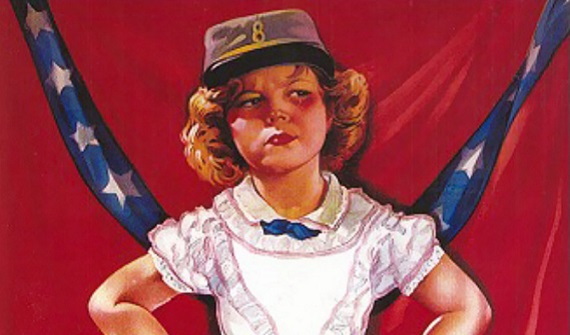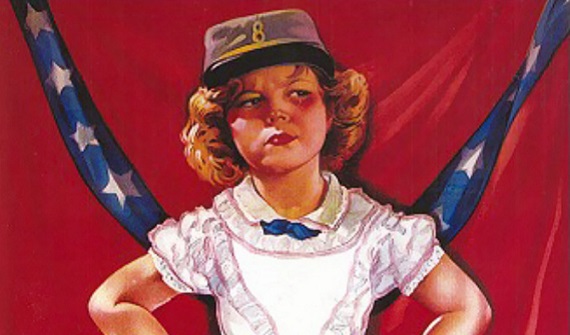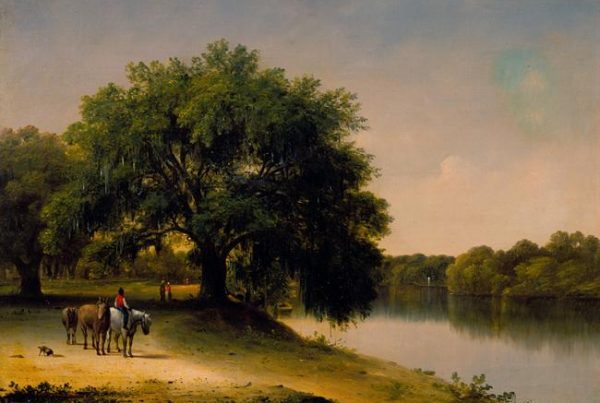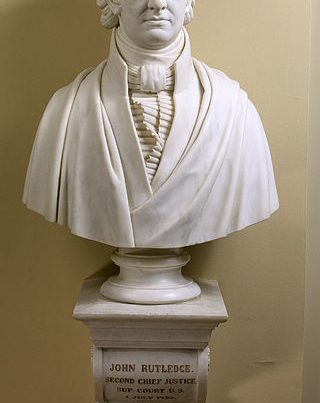In Part 1 we demonstrated how during Hollywood’s Golden Age nearly every Northern-born major star willingly portrayed a sympathetic and admirable Confederate character. That phenomenon has continued up to the present. Admirable Confederates still appear played by major actors. What has changed in recent times is that there have been evil Confederates appearing more often on the screen and the once popular theme of good Southerners oppressed by Reconstruction has disappeared.
Of course the foremost examples of recent times are Ron Maxwell’s great American epics Gettysburg and Gods and Generals, with sympathetic Confederates portrayed by such non-Southerners as Martin Sheen, Tom Berenger, Stephen Lang, , Richard Jordan, and Bruce Boxleitner.
Interestingly, one of the major Northern characters in Gettysburg is played by a Southerner—Texan Sam Elliott as John Buford (not entirely off since Buford was from Kentucky and had a cousin who was a Confederate general). Even more peculiar, Johnny Cash is cast as John Brown in The North and the South miniseries and Texan Rip Torn plays U.S. Grant in the miniseries The Blue and the Gray. Think about it. I suspect it is because it is Southerners who best convey the persona of Old Americans and that movie creators gravitate to this unconsciously. It is perhaps relevant in this regard that the most authoritative African-American stars are mostly Southern-born— Morgan Freeman, James Earl Jones, Jamie Foxx.
I risk tar and feathers for this, but I think Martin Sheen did a better job with Lee in Gettysburg than the popular Robert Duvall did in Gods and Generals. Almost every Southerner I have ever talked to resents Martin Sheen as Lee. I think this has more to do with dislike of Sheen’s politics than with the performance. Given the impossibility of truly representing Lee, Sheen projected a believable portrayal of seriousness, command, and moral stature. Duvall, who was born in California to a Navy family of Southern background, has played many Southern characters beautifully. But he is too redneck for Lee. The portrayal is all wrong. Lee in 1861 was a man in vigorous late middle age, with a daring military genius quietly waiting below the surface. At the beginning of Gods and Generals, Duvall gives an impression of Lee as a tired old man and with an accent that does not ring true, more Deep South than Old Virginia.
Here are some recent sympathetic Confederates in the movies. Remember, we are showing only non-Southerners playing good Confederates, omitting Southern background actors like Duvall, Elliott, Tommy Lee Jones, James and Stacy Keach, Dennis and Randy Quaid.
Clint Eastwood: The Outlaw Josey Wales
Skeet Ulrich, Tobey Maguire, Jeffrey Wright, Jim Caviezel, and Jewel: Ride with the Devil. Jewel , from Alaska, does a good Southern accent.
Robin Wright as Mary Surratt in The Conspirator ( although the film whitewashes the actual brutality with which she was treated by the Yankees).
Madolyn Smith as Rose O’Neal Greenhow in The Rose and the Jackal.
Armand Assante and Donald Sutherland in The Hunley, although Sutherland’s portrayal of Beauregard is ridiculous.
Alex Hyde-White as Confederate naval hero Catesby Jones in The Ironclads.
Lloyd Bridges and Colleen Dewhurst in the miniseries The Blue and the Gray.
To violate my rule against Southerners, Patricia Clarkson, born in Louisiana, plays a Confederate lady maliciously treated by the Yankees in Pharaoh’s Army.
Texas Rangers (2001): Dylan McDermott and Tom Skerrit, along with Southerner Robert Patrick.
Cliff Robertson as Cole Younger in The Great Northfield Minnesota Raid, not one of the best of the many Jesse James movies, although Duvall lends his talents as Jesse.
Frank and Jesse (1994): Rob Lowe, along with Texan Bill Paxton and North Carolinian Randy Travis. This film is one of the better Jesse James movies, much more historically sound than the earlier Tyrone Power/Henry Fonda entries . Probably the best and most authentic of the lot, The Long Riders, has almost all actors of Southern birth or background—The Keach brothers, the Quaid brothers, and the Carradine brothers. In a recent entry to the field , The Assassination of Jesse James by the Coward Charlie Ford, Jesse is played by Brad Pitt, of appropriate Missouri background.
Interestingly in a 1959 film called The Jayhawkers, set in pre-war Kansas, the murderous Yankee cutthroats, Jayhawkers, who terrorized Missouri from Kansas, are magically transformed into Southern bandits.
Some interesting post-Confederate items:
Robert Redford plays an actor wearing a Confederate uniform in Inside Daisy Clover. In the Spanish-American War epic Rough Riders, Gary Busey (Texas born) is a sympathetic General Joe Wheeler at war again, fighting the Yankees, excuse me, Spanish. In The Ghost and the Darkness, Michael Douglas is a famed lion hunter, an American who is said to have come to Africa because his people lost a war. In Warm Springs, FDR, disabled by polio, is inspired by the example of Confederate general Francis R.T. Nicholls, who lost an arm and a leg in the war but went on to become Governor and Chief Justice of Louisiana.
Despite these good spots, we all know that Hollywood now has Confederates slated most of the time to be unrelievedly evil. One female revenge flick, which shall remain unnamed here, opens with Confederate soldiers attacking a town, directing artillery against a church full of civilians, killing women, and shooting little children in the back. Let’s say that this scenario is not only untrue but a complete reversal of the truth. These are things the boys in blue did, not our people. Do I sense that familiar psychological phenomenon of “projection” at work here— blaming others for our own sins?
The film Alvarez Kelly is based on a true incident in which Confederate cavalry stole a herd of beef cattle from the Yankees to feed the undernourished Army of Northern Virginia. The Confederate cavalry leader is portrayed by Richard Widmark (from Nebraska). He is tough and dedicated but not evil. Except in the eyes of the writer of the ad for the DVD, who says he is “a sadistic Confederate general.” The little Vassar or Haverford liberal arts graduate who wrote this cannot be expected to know any real facts and is just acting out of pre-programmed assumptions. The real man on whom the character is based was General Thomas Rosser. Interestingly, after the war he became a respected citizen of Minnesota, a U.S. consul in Canada, and a major general of volunteers in the Spanish-American War. I wonder if they thought in Minnesota that he was a sadist?
The historical ignorance of the writers of such synopses is a subject in itself. A description of an Old South story, Way Down South (1939) tells us about the “segregation of pre-Civil War Louisiana.” Now antebellum Louisiana had slavery, but it did not have segregation, something that the Yankees, who invented segregation, found most distasteful. The ad for a PBS epic on slavery tells of an “African prince” who was “imprisoned on a Mississippi plantation” for many years. It is hard for people with no understanding of the past or of human nature to grasp, but plantations were not prisons. There was no barbed wire, no guard dogs, no watchtowers, no armed jailers, and very few locks. Frequently planters slept in an unlocked house with their slaves. Nor do I think “prince” was a common term among Africans, there being no clear hereditary rule of descent for rulers, who were generally the last survivors of bloodbaths.
A choice specimen of Hollywood vs. the Confederacy is Cold Mountain, which purports to picture the North Carolina home front in the War. It is based on the novel by Charles Fraser. Fraser is a competent novelist, but no more so than many other contemporary Southern writers. But he has discovered a key to the bank—trash the homefolks to support the outsiders’ hostile beliefs. The portrayal of Confederate home guards is patently absurd. It incorporates every nasty, hackneyed Hollywood cliché about Southern whites: racists, rapists, incestuous, murderous, treacherous, vengeful, dimwitted, hypocritical, ignorant, etc. One fears that some people actually believe this driveling parody of history.
The friendly interpretation of the Confederacy in early Hollywood was accompanied by a similar view of the Old South. Besides Vivien Leigh in Gone with the Wind, who can forget Bette Davis as the tempestuous Southern belle in Jezebel? In Way Down South the Canadian Bobby Breen was so admirable as a plantation owner that many people thought he was a Southerner. Then there was Bing Crosby in Mississippi and Dixie.
We can be fairly certain that, accompanying a general decline of knowledge in the American public, most people now get their notions of the Old South and the Confederacy from the silly melodrama Roots and Ken Burns’s government- subsidised Radical Republican propaganda piece. Americans are now obsessed with race, and “slavery” is now the main theme of our history. This feeds upon the all-too-common American self-righteousness that preens itself on condemning the sins, real or imagined, of others.
As far as cinema is concerned, Southerners are going to have to rely on their own resources for truth-telling. We have a number of advantages in this regard—abundant talent and the fact that our Confederate forebears are intrinsically attractive despite all that has been done of late to libel them. Some recent productions, which ought to be on every Southern movie shelf, show what can be done. The Last Confederate (2005) and Firetrail (2007) are full-length films independently produced with mostly South Carolinians and Georgians on both sides of the camera. They present an authentic and moving portrayal of our people during Sherman’s March. Another good example of effective and honest Southern film-making is the shorter film Hunter’s Raid: Defending Hearth and Home, produced in 2010 by the Historic Sandusky Foundation in Virginia.
Roots and Ken Burns are likely to show the way to what we can expect from now on in popular media portrayals . It is a strange and unsettling feeling for an aware Southerner to know that he and his are the objects of hatred and lies from fellow citizens who he has never harmed and toward whom he has never intended any harm. But for the most part, Southerners do not even notice. We are an easy-going and tolerant Christian people and do not go out of our way to search out and deplore what other people are up to. Besides, as the late Tom Landess once observed, Southerners are so used to abuse that, like an old injury, we hardly notice it.
(Our study of the Southern people as seen by Hollywood will continue into other under-explored regions of diseased imagination.)







